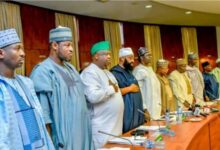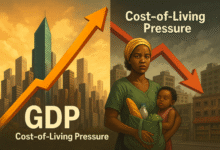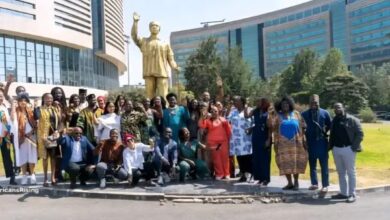Creating self-reliant young Nigerians through SEA-Hub initiative
 Amidst the continued rise in unemployment in the country, Unemployment among young people in Nigeria has continued to rise. Experts say mobilising youths to be self-reliant is a necessary step to curtail the trend.
Amidst the continued rise in unemployment in the country, Unemployment among young people in Nigeria has continued to rise. Experts say mobilising youths to be self-reliant is a necessary step to curtail the trend.
According to the National Bureau of Statistics (NBS) the unemployment rate among young people in the 2nd quarter of 2022 aged between 15 and 34 years was 34.9 per cent, up from 29.7 per cent.
NBS said the rate of underemployment for the same age group rose to 28.2 per cent from 25.7 per cent in 3rd quarter of 2018, adding that the rates were the highest when compared to other age groupings.
One of the measures to achieve such is exposing youths to entrepreneurship skills. It will not only make them productive but also promote their creativity and wealth generation.
Stakeholders say due to lack of opportunities and resources, many young people struggle to explore their creative skills.
Consequent to this, the Deutsche Gesellschaft für Internationale Zusammenarbeit (GIZ) says it is determined to contribute its quota towards harnessing the energy and intellect of youths towards national growth.
The German Development Agency, through its Pro Poor Growth and Promotion of Employment in Nigeria programme (SEDIN) said it would achieve that through its Student Entrepreneurship Activity Hub (SEA-Hub).
This initiative, being implemented in collaboration with Nigerian partners, is expected to stimulate self-reliance reliance in young Nigerians in public and private secondary schools.
Speaking at a media tour organised by GIZ-SEDIN to showcase the innovations of students entrepreneurs under the initiative in selected schools in Lagos, Markus Wauschkuhn, said the initiative would engender entrepreneurship spirit youths by making them solution providers.
“The SEA-Hub was piloted in Niger State in 2016 and it is currently being implemented in Niger, Ogun, Plateau, Edo, Lagos, Yobe, Kaduna, Delta, Imo, Osun and Oyo states, including the Federal Capital Territory.
“Since the inception of SEA-Hub, over 30,000 secondary school students have been reached in 342 schools across the participating states”, said Wauschkuhn, Head of Cluster, Sustainable Economic Development, GIZ Nigeria.
No fewer than 300 secondary school leavers trained under the programme, he said, have established their own businesses and were also implementing community projects as part of social responsibility.
Reacting to the initiative, Ms Adetola Salau, Senior Special Assistant on Education to Gov. Babajide Sanwo-Olu of Lagos, said teaching students how to fish rather than giving them fish is the right approach to job creation.
Salau said “the students have acquired the skills to provide and apply the knowledge that they have to take care of challenges around them”
Corroborating the stance, an alumnus of the SEA-Hub initiative in Ijebu Igbo Girls Grammar School, Ogun, Miss Olayemi Olamide, who was also part of the tour, said she had opened a clothing shop where she used Adire designs to make outfits.
“I started with cloth enhancement; I collected faded cloths from people who wanted to throw them away and branded them into new ones.
“I learnt the skills while I was a member of SEA-Hub club. My business is now two years old and I am into digital marketing of my products.
“I have five people working for me in Ogun State where I currently run my business I am trying my best to be unique so that I can compete favourably at the market.
“The patronage is good but I need more customers. I need an investor and planning to venture into the export market,” she said.
Olamide, whose company is called Rayyems Clothing (Everything Adire), advised youths not to be idle.
Another SEA-Hub alumnus, Egbewunmi Olusanjo, a graduate of Abesan Senior High School, Lagos, said after joining the SEA-HUB in 2021 he developed software that linked skilled people to those who need their services.
Olusanjo, a 17 year-old boy, said: “my project is called “My Handy Africa”. It is an app that connects skilled workers to people who need their services.
“It is a platform that also connects people who need skills to acquisition centres and also links undergraduates to internship programmes.
“I am currently on the second stage further enhancement of the software development.
“I had the idea of the app development before I joined the SEA-HUB programme but I didn’t know how to develop it. So, joining SEA-Hub was a means to unlock my entrepreneurial potential”.
Miss Akinfenwa Boluwatife, a Senior Secondary School 3 student of Alimosho Senior Grammar School, Lagos, said she had acquired five different entrepreneurship skills as a member of SEA-HUB club in her school.
Boluwatife, Managing Director of the SEA-Hub club in her school, said she leant basic entrepreneurship skills, particularly how to make liquid, bar soap and insecticides using rabbit urine as well as how to make plantain chips.
“These skills have helped me to be self-reliant and a better person”, she said.
On combining her studies with entrepreneurship, she said “it is not affecting my studies because I use my break time and weekends to do the business.
“Our parents are supportive of what we do and they also patronise us. They buy our liquid soap, insecticides. They are really happy that their children are learning different skills apart from their academics “.
She urged students to get entrepreneurship skills to complement their academic pursuit to make them relevant in a skill driven world.
Speaking on behalf of his team, during an exhibition, Wisdom Kanu, Managing Director, Abesan Secondary school SEA-Hub said joining the club had made members creative thinkers, risk takers and profit-oriented.
“We do menial jobs such as selling of discarded bottles to generate capital for our business ideas. We also source raw material for some of our products from our parents tailoring shops.
“Our major aim is to start a business with little or no capital and our products are in high demand,” he said.
Kanu said sustainability of activities of the club was guaranteed through reinvestment of profits into the business.
“We do both offline and online marketing of our products, for the online, we use our school’s website platform,” he said.
On her part, Oluwafummilola, Kezia, Staff Adviser, SEA-Hub club, Abesan Senior High School, Lagos, said the journey of the club in the school had been impactful because students now think outside the box to develop business ideas.
Kezia said, “the initiative is laudable and members of the club can make bags, shoes, fashionable clothes, crunchy peanuts and other lovely products; all these they started with little capital”.
The SEA-Hub initiative is empowering young Nigerians to be nation builders it is important that more state governments key into it to unlock the entrepreneurial skills of their young people.
CREDITED: Joy Odigie, News Agency of Nigeria (NAN)











